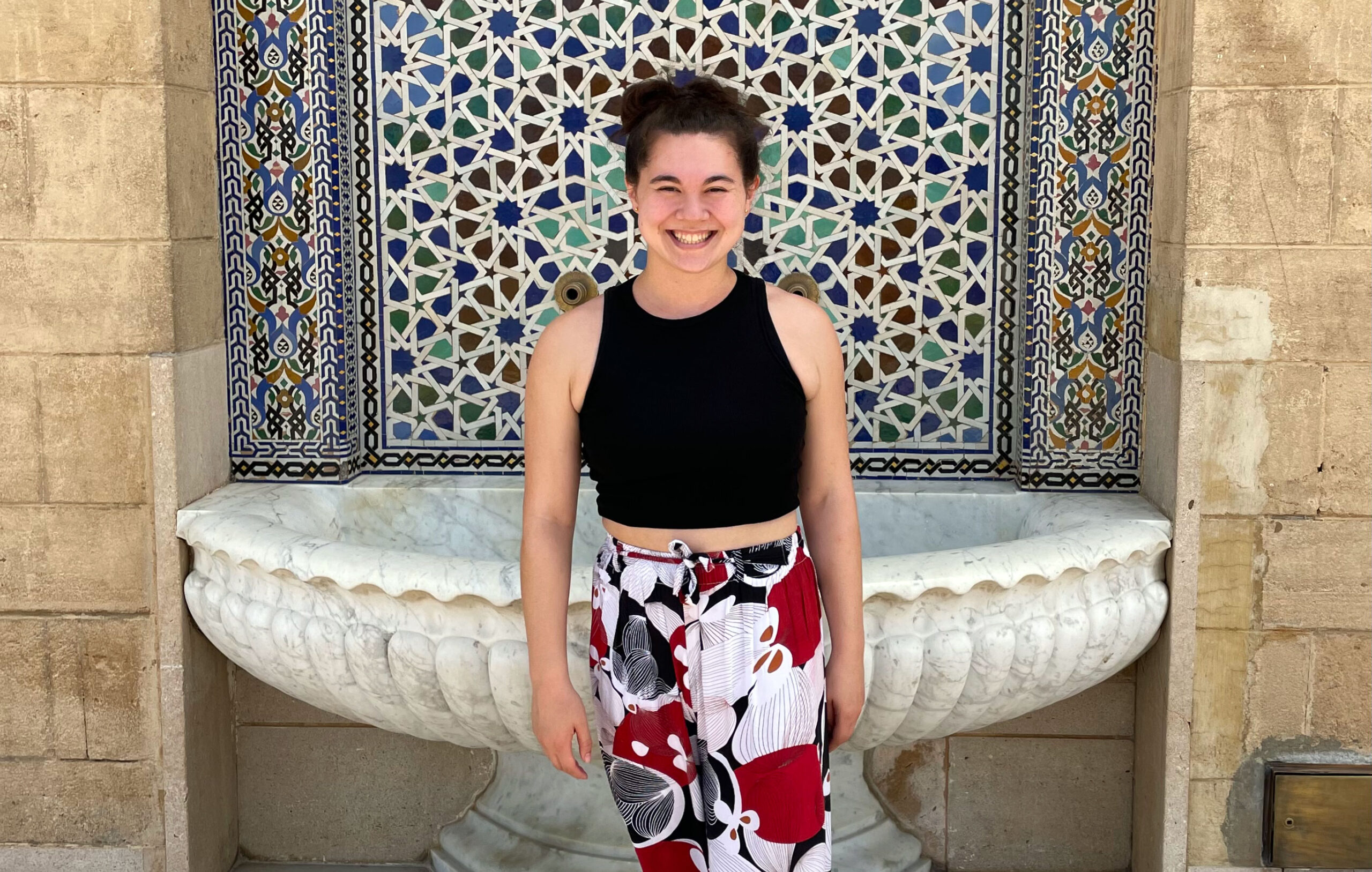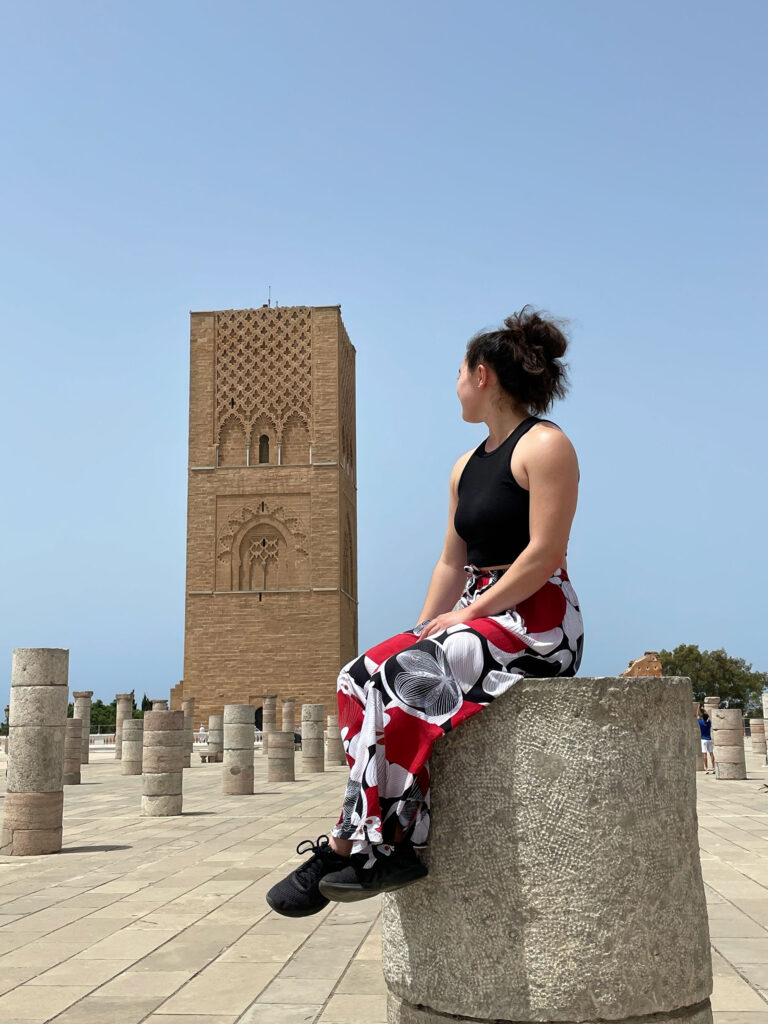Building fluency in life, learning, and language

Lia Tang ’23, M.A. ’24, has always loved learning about other cultures and languages. When she came to Clark in 2019, she had just finished a gap year in Mexico, living with a host family and becoming more fluent in Spanish. She also began learning Mandarin, in part because her mother’s family comes from China.
Thanks to two study abroad opportunities while at Clark, Tang now has added modern standard Arabic to her list. She studied in Jordan the spring of her junior year and lived with a host family. Last summer, funded by a U.S. State Department Critical Language Scholarship, she attended the Arab American Language Institute in Morocco (AALIM) — one of 25 students chosen to attend the institute from across the U.S. — in Meknes, more than 300 miles northwest of Marrakesh.
“Study abroad is a great opportunity. It exposes you to new perspectives and new ways of living,” Tang says. “It makes you question and challenge things that you take for granted in your own culture, and it opens your worldview. It also makes you appreciate things about your own culture.”
Although Tang studied mostly modern standard Arabic at AALIM, she had to communicate in Moroccan Arabic with her host family — a father, mother, and their two children, ages 2 and 4.
“Moroccan Arabic is different from modern standard and also Jordanian Arabic, which I previously knew,” she says, “but we did have some Moroccan Arabic classes, and from learning a bit from my host mom, I was definitely able to pick up on the basics.”
“Study abroad is a great opportunity. It exposes you to new perspectives and new ways of living.”
— Lia Tang
She learned not to trust a 2-year-old when learning a new language because they are learning their home language, too.
“I needed to be careful and not learn from him, because when he learned the (Moroccan Arabic) word for diaper, he started pointing to things and calling them all diapers. Everything was a diaper,” she recalls.
The 4-year-old girl was more helpful. “She would point to things and say what they were, and she would bring things from the kitchen and say, ‘This is a bowl,’ ” in Moroccan Arabic.
Tang took three hours of language classes each weekday at AALIM and was partnered with a community member to practice Arabic. The school also offered cultural activities and trips.
“We got to learn about traditional medicine, calligraphy, and the spice market — a lot of really cool things,” she says.

Tang and her friends traveled throughout Morocco, to Chefchaouen (known as “the blue city” for its cerulean-colored houses, doors, and roofs), Rabat, Fez, and Marrakesh, where a devastating earthquake hit six weeks after they had returned to the U.S.
Exploring GIS and story mapping
After she graduates this year with an M.A. in community development and planning through Clark’s Accelerated Degree Program, Tang hopes to travel more. Eventually, she would like to apply her knowledge of languages and culture to a job working with immigrants and refugees, especially youth. She has taken several classes in GIS (geographic information science), a field where satellite data and geospatial analytics can be applied to a wide range of social and environmental issues.
“I’m really interested in the social applications of GIS,” Tang says, “like where you are researching people’s access to green space and healthy food. I’m also interested in story mapping, where you are melding GIS with people’s stories and lived histories in specific places.”
In a Community Needs and Resource Analysis graduate course last fall, she gained skills and experience by reviewing programs for immigrant and refugee youth in the Worcester Schools and identifying ways to fill the gaps in support.
‘I like doing things to help and support others’
Besides studying abroad, one of Tang’s most memorable experiences while at Clark was participating in the Connections program for incoming students of color, both as a participant and as a mentor.
“I couldn’t have imagined coming to Clark without Connections because I made so many friends through that, and it also helped me think more about my own identity,” says Tang, who grew up in St. Paul, Minnesota. “I’m biracial, and I never really got the opportunity to explore that before coming to college.”
As an undergraduate major in geography, with minors in data science and international development, Tang was active in the Clark community and in Worcester. She applied her fluency in Spanish to Herencia y Cultura Hispánicas (Hispanic Culture and Heritage), a course through which she and her peers assisted with the teaching of native-Spanish-speaking children at a local elementary school.
She also volunteered with Centro’s food pantry and African Community Education, both nonprofit organizations in Worcester; tutored incarcerated youth through the Petey Greene Program; participated in a six-week summer teaching fellowship in Worcester through Generation Teach; and served as a teaching assistant in Clark’s computer science courses, tutor in the Qualitative Skills Center, and peer mentor for incoming students. A member of the executive board of the Asian Student Union, she participated in Rise for Racial Justice, Variant Dance Group, and International Gala.
“I like doing things to help and support others,” she says.


